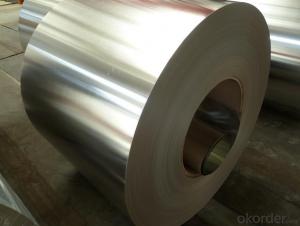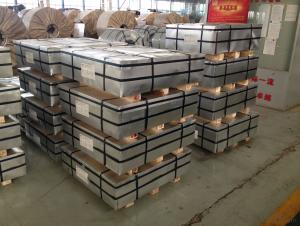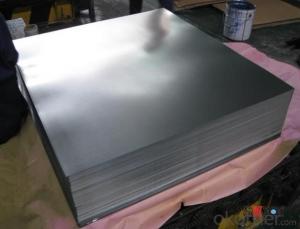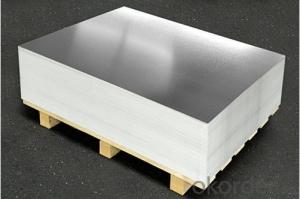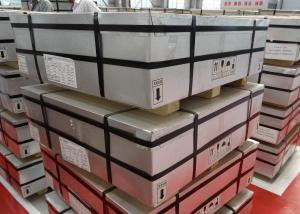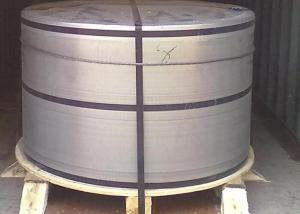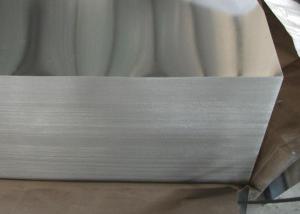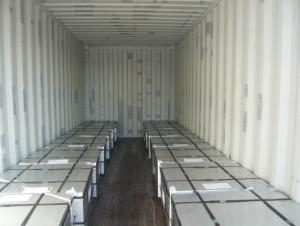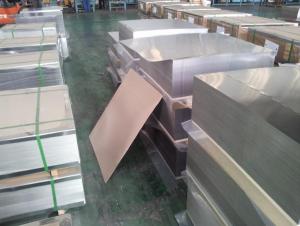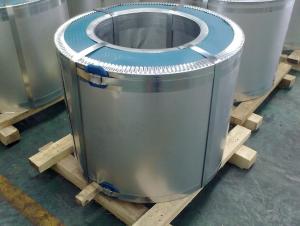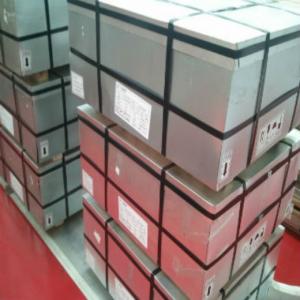Electrolytic Tinplate Sheets for 0.17 Thickness SPCC Sheets
- Loading Port:
- Tianjin
- Payment Terms:
- TT or LC
- Min Order Qty:
- 25 m.t.
- Supply Capability:
- 500 m.t./month
OKorder Service Pledge
OKorder Financial Service
You Might Also Like
1.Structure of Electrolytic Tinplate Sheets for 0.17 Thickness MR Sheets Description
Electrolytic Tinplate Sheets is one of the metal packing materials, which is widely used for making painting cans ,chemical package cans , electrical cable ,battery and metal printing etc.
2. Main Features of Electrolytic Tinplate Sheets for 0.17 Thickness MR Sheets
Steady and high quality
Fast shipment
Good experience for export work
For the surface, Plate uniform in thickness,uniform and smooth tin coating, without flaws,rusts,scratch,wave,nick of tin coating etc.
Price competitive
3.Electrolytic Tinplate Sheets for 0.17 Thickness MR Sheets Images
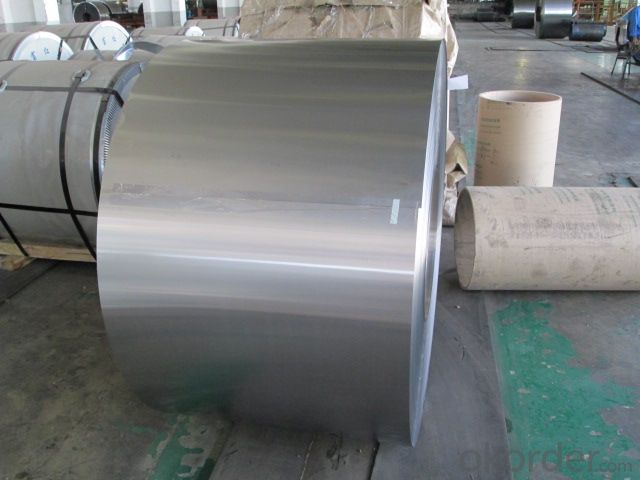
4. Electrolytic Tinplate Sheets for 0.17 Thickness MR Sheets Specification
Standard : GB2520-2000 ,JIS G3303
Steel type : SPCC
Coating : 2.8/2.8
Surface: Bright, Stone ,
Thickness:0.17MM
Width :600MM~1000MM
Temper : T1~T5
Package: tinplate wrapped completely with an inner cover of plastic or waterproof papers with vorners protected with metal angels.
5.FAQ of Electrolytic Tinplate Sheets for 0.17Thickness MR Sheets
A. What is the package of tinplate? (Referred as below)
For sheets, thin plastic film + rust-proof paper + metallic cover + metallic angles+ steel band strips + fumigated wooden pallet.
For coil, thin plastic film + rust proof paper + metallic cover + steel band strips + fumigated wooden pallet
B. The surface of tinplate could you supply?
Stone finish, Bright finish, Matte finish, Silver finish
C. What quantity is the minimum order of tinplate?
Usually, the minimum quantity is 25MT. For special case, consult with us.
D. Can it make to be BA or CA for annealing?
Yes, both can do with.
E. If it is for regular size?
Yes, 0.17mm always with DR8 or T5 for temper.
- Q:How does tinplate compare to other types of packaging materials?
- Tinplate has several advantages over other types of packaging materials. It is highly durable, providing excellent protection for the contents. Tinplate also has good resistance to corrosion, ensuring the product remains fresh and uncontaminated. Additionally, it is lightweight and easily recyclable, making it an environmentally friendly option. Furthermore, tinplate offers a visually appealing and versatile packaging solution, with various printing and shaping options available.
- Q:Can tinplate be used for kitchenware?
- Yes, tinplate can be used for kitchenware. Tinplate is a type of steel coated with a thin layer of tin, which provides corrosion resistance and makes it suitable for food contact applications. It is commonly used for making cans, containers, and other kitchen utensils due to its durability, easy cleaning, and ability to keep food fresh.
- Q:How is tinplate affected by different types of cosmetics?
- Tinplate, which is a thin steel sheet coated with a layer of tin, is generally resistant to the effects of different types of cosmetics. However, certain cosmetics that contain high levels of acids or alkalis can potentially cause corrosion on the tin coating. Additionally, prolonged exposure to certain chemicals or solvents found in cosmetics may lead to slight discoloration or tarnishing of the tinplate. Therefore, it is important to choose cosmetics that are formulated to be safe for use with metal packaging, and to avoid prolonged contact between cosmetics and tinplate to maintain its appearance and integrity.
- Q:How does tinplate compare to plastic-coated steel in terms of properties and applications?
- Tinplate and plastic-coated steel have different properties and applications. Tinplate is known for its corrosion resistance, excellent formability, and ability to hold a tight seal. It is widely used in the packaging industry for products like food cans and aerosol containers. On the other hand, plastic-coated steel provides superior chemical resistance and impact strength. It finds applications in industries like automotive, construction, and electrical, where durability and resistance to environmental factors are crucial. Overall, while tinplate is preferred for its sealing properties in packaging, plastic-coated steel is favored for its durability and chemical resistance in various industrial applications.
- Q:How to open cans
- A tin can be opened, the handle is separated, and the canned fruit can be clamped by the head, and the rotating knob and the tin can be opened. Remember, when you turn the knob, you can only rotate clockwise and turn counterclockwise clockwise.
- Q:How is tinplate coated?
- Tinplate is coated through a process called electrolytic tinning. In this process, a thin layer of tin is electroplated onto the surface of steel sheets or strips. The steel is immersed in an electrolyte bath containing tin salts, and an electric current is passed through the bath. This causes the tin to deposit onto the steel surface, creating a protective coating that prevents corrosion and enhances the appearance of the tinplate.
- Q:How does tinplate perform in terms of temperature resistance?
- Tinplate has good temperature resistance, as it can withstand both high and low temperatures without significant deformation or degradation.
- Q:What are the different coatings used on tinplate?
- There are several different coatings used on tinplate, including tin-free steel (TFS), electrolytic tinplate (ETP), tin-free steel chromium coated (TFS Cr), and tinplate with an organic coating (lacquered tinplate). These coatings serve various purposes such as providing corrosion resistance, enhancing the appearance, and improving the overall durability of the tinplate.
- Q:Can tinplate be used for high-temperature applications?
- No, tinplate is not suitable for high-temperature applications due to its low melting point.
- Q:How does tinplate perform in terms of chemical resistance?
- Tinplate performs well in terms of chemical resistance due to its tin coating, which acts as a barrier against corrosion and chemical reactions. This coating provides excellent protection against acidic substances and prevents the metal from being affected by certain chemicals, making tinplate a reliable choice for packaging materials in various industries.
1. Manufacturer Overview |
|
|---|---|
| Location | |
| Year Established | |
| Annual Output Value | |
| Main Markets | |
| Company Certifications | |
2. Manufacturer Certificates |
|
|---|---|
| a) Certification Name | |
| Range | |
| Reference | |
| Validity Period | |
3. Manufacturer Capability |
|
|---|---|
| a)Trade Capacity | |
| Nearest Port | |
| Export Percentage | |
| No.of Employees in Trade Department | |
| Language Spoken: | |
| b)Factory Information | |
| Factory Size: | |
| No. of Production Lines | |
| Contract Manufacturing | |
| Product Price Range | |
Send your message to us
Electrolytic Tinplate Sheets for 0.17 Thickness SPCC Sheets
- Loading Port:
- Tianjin
- Payment Terms:
- TT or LC
- Min Order Qty:
- 25 m.t.
- Supply Capability:
- 500 m.t./month
OKorder Service Pledge
OKorder Financial Service
Similar products
New products
Hot products
Hot Searches
Related keywords
